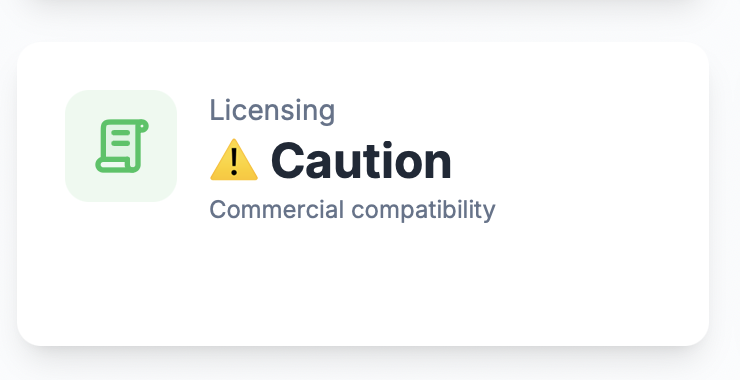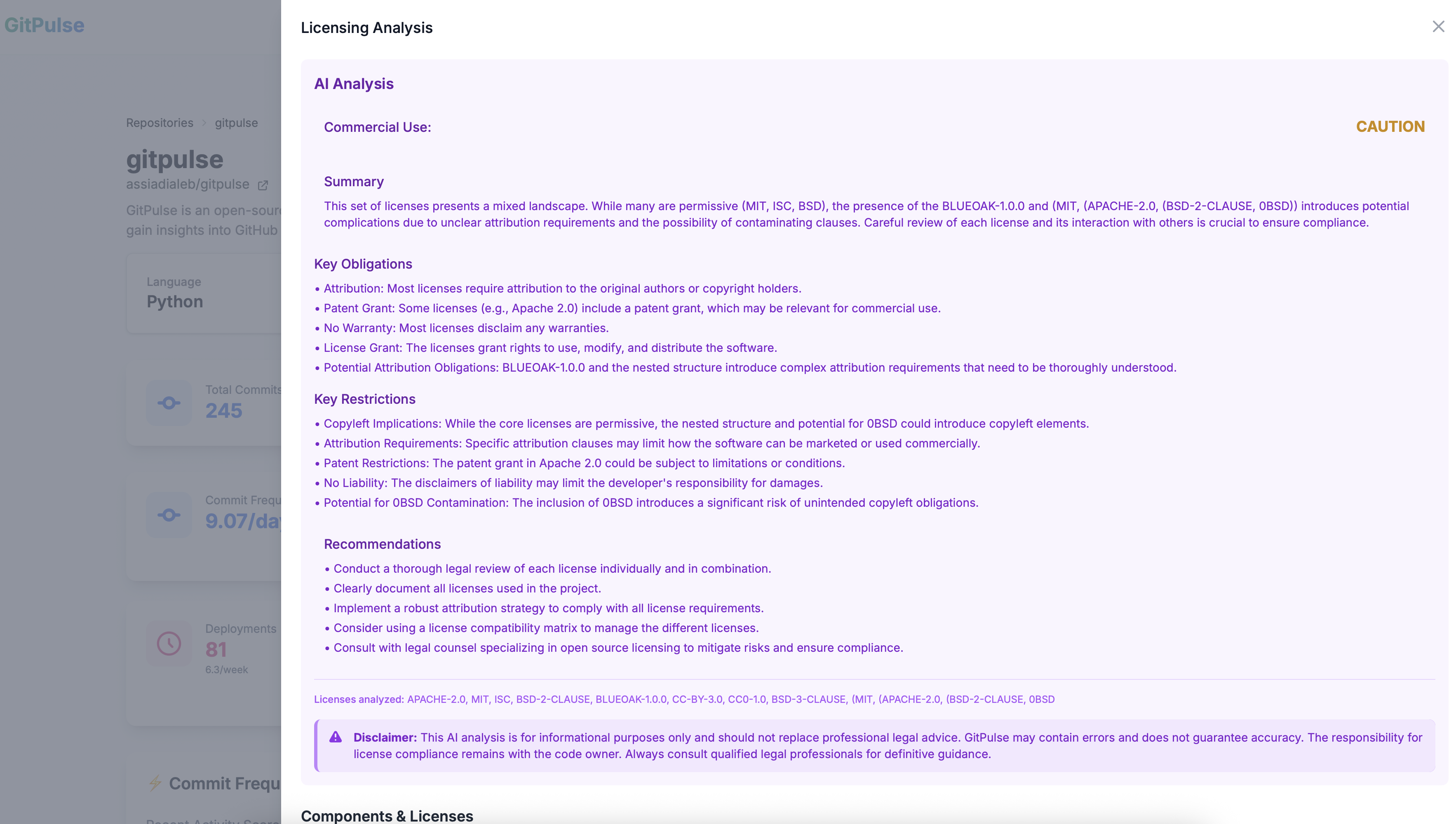License Analytics
Track license compliance and dependency management
GitPulse analyzes software licenses and SBOM (Software Bill of Materials) components to help you understand license compliance and commercial compatibility.
What is SBOM?
A Software Bill of Materials (SBOM) is a formal, machine-readable inventory of software components and dependencies. It provides a detailed list of all the open source and third-party components used in your software, including their versions, licenses, and security vulnerabilities.
Why SBOM matters: - Transparency: Complete visibility into your software supply chain - Compliance: Track license obligations and restrictions - Security: Identify vulnerable dependencies - Risk Management: Assess legal and security risks
License Overview
License analytics provide insights into the legal implications of your software dependencies and help ensure compliance with open source licenses.
Key License Metrics
Commercial Compatibility
A simple indicator showing whether your software's dependencies are compatible with commercial use.

What it tells you
- Whether your software can be used commercially
- Legal risk assessment
- License compliance status
License Analysis Details
Click on the Commercial Compatibility metric to access a comprehensive AI-powered analysis showing: - Detailed legal analysis of all licenses - Component-by-component license breakdown - Legal obligations and restrictions - Compliance recommendations

What it tells you
- Complete legal assessment
- Specific license obligations
- Risk mitigation strategies
- Compliance requirements
License Categories
Commercial-Friendly Licenses
Licenses that allow commercial use with minimal restrictions: - MIT: Very permissive, allows commercial use - Apache 2.0: Permissive with patent protection - BSD: Simple permissive license - ISC: Simplified BSD license - Unlicense: Public domain dedication
What it tells you
- Safe for commercial use
- Minimal legal obligations
- Maximum flexibility
Copyleft Licenses
Licenses that require source code sharing under certain conditions: - GPL: Requires source code sharing when distributing - AGPL: Requires source code sharing even for network use - LGPL: Less restrictive copyleft for libraries - MPL: Moderate copyleft with file-level requirements
What it tells you
- May require source code disclosure
- Can affect commercial licensing
- Need careful legal review
License Health Indicators
Healthy License Patterns
Good signs
- All components have commercial-friendly licenses
- Clear license documentation
- No conflicting license obligations
- Proper attribution requirements met
Warning Signs
Concerning patterns
- Copyleft licenses present
- Mixed license types
- Unclear license obligations
- Missing license information
Using License Data
For Development Teams
- Dependency Selection: Choose components with compatible licenses
- License Tracking: Monitor license changes in dependencies
- Compliance Management: Ensure proper attribution and obligations
- Risk Assessment: Identify potential legal issues early
For Management
- Legal Risk Assessment: Understand potential legal implications
- Compliance Planning: Plan for license obligations
- Commercial Strategy: Assess impact on business model
- Due Diligence: Support legal review processes
Best Practices
Improving License Compliance
- License Review: Review licenses before adding dependencies
- Documentation: Maintain clear license documentation
- Attribution: Provide proper license attribution
- Monitoring: Regularly review license compliance
Team Collaboration
- Legal Consultation: Work with legal experts for complex licenses
- Training: Educate team on license implications
- Process: Establish license review processes
- Automation: Use tools to track license changes
Troubleshooting
Common Issues
Copyleft Licenses Detected
- Cause: Dependencies with GPL, AGPL, or other copyleft licenses
- Solution: Review license implications and consider alternatives
Missing License Information
- Cause: Components without clear license information
- Solution: Contact maintainers or find alternative components
License Conflicts
- Cause: Incompatible licenses in the same project
- Solution: Review legal implications and consider alternatives
Getting Help
- Legal Review: Consult with legal experts for complex licenses
- Documentation: Review license documentation thoroughly
- Community: Seek guidance from open source communities
- Tools: Use automated license compliance tools